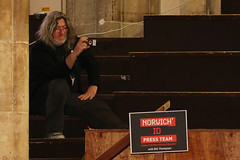I’ve long been fascinated by the tales of ‘numbers stations’, radio stations that broadcast lists of numbers. According to Wikipedia
Numbers stations are shortwave radio stations of uncertain origin. They generally broadcast artificially generated voices reading streams of numbers, words, letters (sometimes using a spelling alphabet), tunes or Morse code. They are in a wide variety of languages and the voices are usually women’s, though sometimes men’s or children’s voices are used.
Evidence supports popular assumptions that the broadcasts are used to send messages to spies. Numbers stations appear and disappear over time (although some follow regular schedules), and their overall activity has increased slightly since the early 1990s. This increase suggests that, as spy-related phenomena, they were not unique to the Cold War.
There are lots of them around, and this recording shows what I think is a new one. It is well worth listening to.
[audio:poacher.mp3]It may even lead you to something interesting.






